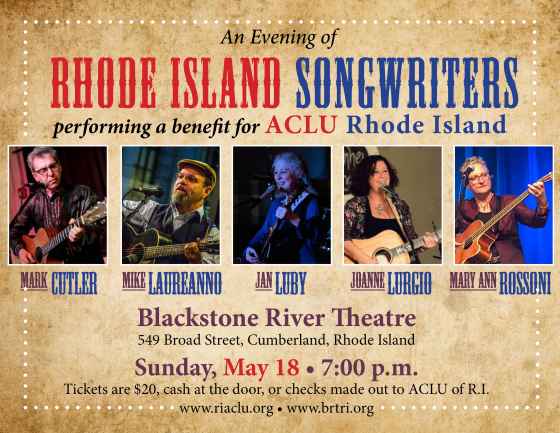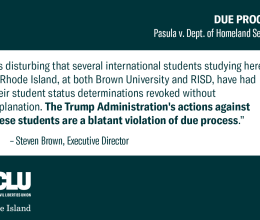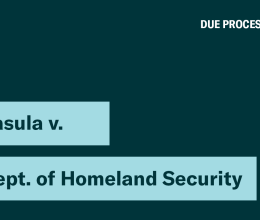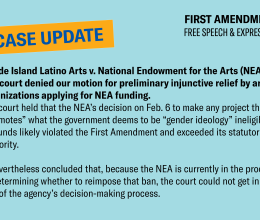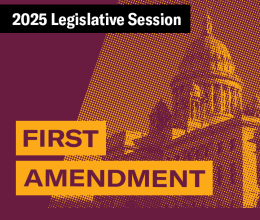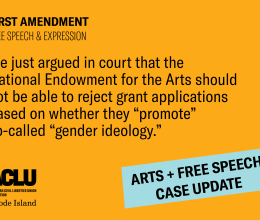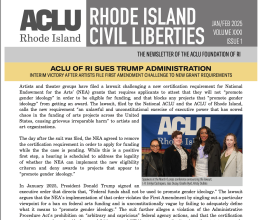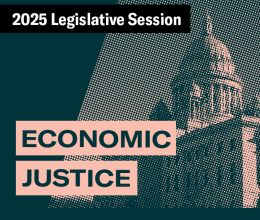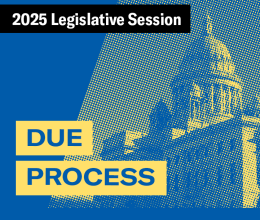The ACLU of Rhode Island today has added new constitutional claims to a lawsuit it filed in May against the State, challenging the state Division of Taxation’s position that a special sales tax exemption for Rhode Island authors applies only to works of fiction, and not to non-fiction, because non-fiction is not “creative and original.” The lawsuit, filed by ACLU of RI cooperating attorney Lynette Labinger, continues to argue that making such a distinction on the content of the work violates the First Amendment’s guarantees of freedom of speech and freedom of the press, but adds new claims in light of troubling developments since the suit’s original filing.
After the suit was filed, state officials denied they made such a distinction, notwithstanding the experience of three authors named in the lawsuit who were advised on more than one occasion that their non-fiction books would not qualify for an exemption. As a result of the State’s new claim, the authors – Paul Caranci, Steven Porter and Lucie Contente – applied for exemptions for their non-fiction books. In response, Porter received an exemption certificate in the mail with no questions asked. Carcanci and Contente heard nothing from the Division of Taxation after two months, and so followed up. Both authors then received phone calls from a Taxation official, asking whether their books were “limited edition” and whether they would “agree to sign and number each copy before sale.” They both said they would do so if required, but neither author has received an exemption certificate. No requirement to number their books was made of the authors in seeking a tax exemption for their fiction books.
Citing these arbitrary responses from the Division, the lawsuit was amended today to add new claims that the state’s latest actions also violate the due process and equal protection rights of authors. The suit claims the state’s application of the law, in addition to violating the First Amendment, “is arbitrary and capricious” and “discriminatory.” Stating that this arbitrary implementation of the law “concerns the fundamental rights of free speech and free press,” the State’s response “cannot withstand strict scrutiny, in that it cannot be shown that it is narrowly tailored to further a compelling state interest and the least restrictive means have been used to accomplish it.”
The law at issue, enacted by the General Assembly in 2013, is designed to promote the work of local writers and artists. It exempts from the sales tax “original and creative works” sold by writers, composers, and artists residing in Rhode Island. At some point, however, the suit claims that the Taxation Division, in consultation with the RI State Council on the Arts (RISCA), determined that non-fiction books are not “original and creative works,” and therefore not eligible for the tax exemption.
The plaintiffs in the lawsuit are:
* The Association of Rhode Island Authors (ARIA), a non-profit organization whose membership consists of about three hundred Rhode Island writers, and whose mission is to raise awareness of, and promote, local authors, and educate students about the publishing industry.
* Steven Porter, the President of ARIA, who has received an exemption for fiction books but, until receiving an exemption this month, was advised by RISCA that his non-fiction work would not qualify for a sales tax exemption.
* Paul Caranci, who has written numerous non-fiction books on a variety of topics, including histories of North Providence, political corruption in the state, and Rhode Island’s last execution, but who, like Porter, was told the exemption applied only to works of fiction.
* Lucie Contente, a local writer of both fiction and non-fiction books, who has received a sales tax exemption for her works of fiction, but was not granted an exemption for her non-fiction books.
The amended lawsuit seeks a court order barring the state from excluding non-fiction works from the sales tax exemption or from imposing “additional or different conditions, qualifications” to nonfiction works. More information on the lawsuit, Association of RI Authors v. Savage, can be found here.

